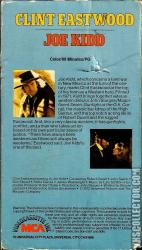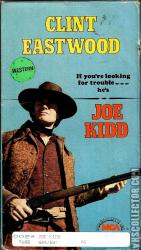Joe Kidd
Catalog Number
VHS66050
-
Primary Distributor (If not listed, select "OTHER")
Catalog Number
VHS66050
Primary Distributor (If not listed, select "OTHER")
Release Year
Country
88 mins (NTSC)
N/A | N/A | N/A
N/A | N/A
Joe Kidd (1972)
Additional Information
Additional Information
If you're looking for trouble - - - he's JOE KIDD
In John Sturges'sAmericanized version of Sergio Leone's Man-With-No-Name films, Clint Eastwood is Joe Kidd, a cryptic stranger who arrives in the New Mexican town of Sinola, where Mexican bandito/revolutionary Luis Chama (John Saxon) has organized a peasant revolt against the local landowners, who are throwing the poor off land that rightfully belongs to them. When a posse -- financed by wealthy landowner Frank Harlan (Robert Duvall) -- is formed to capture Luis, Kidd is invited to join but prefers to remain neutral. Harlan keeps badgering Kidd to join up, and Kidd finally relents when he finds that Luis's band has raided his own ranch and one of his ranch hands has been injured. The bloodthirsty posse rounds up five Mexicans hostages and threaten to kill them unless Luis surrenders to them. One of the hostages is the attractive Stella Garcia (Helen Sanchez), and Kidd falls in love with her. Harlan notices this and throws Kidd in jail to prevent him from helping Stella and the Mexicans. Kidd decides the position himself as the voice of reason in this nest of disorder. He escapes and saves the Mexican hostages, determined to capture Luis himself and see that he gets a fair trial. But when Kidd captures Luis and delivers him to Sheriff Mitchell (Gregory Walcott), Harlan is in town waiting for him.
Joe Kidd is a 1972 American western film starring Clint Eastwood and Robert Duvall, written by Elmore Leonard and directed by John Sturges.
The film is about an ex-bounty hunter hired by a wealthy landowner named Frank Harlan to track down Mexican revolutionary leader Luis Chama, who is fighting for land reform. It forms part of the Revisionist Western genre.
Clint Eastwood stars as Joe Kidd, a former bounty hunter who is in jail for hunting on Indian land and disturbing the peace in the New Mexican town of Sinola. Mexican bandito/revolutionary Luis Chama (John Saxon) has organized a peasant revolt against the local landowners, who are throwing the poor off land that rightfully belongs to them.
When a posse — financed by wealthy landowner Frank Harlan (Robert Duvall) — is formed to capture Chama, Kidd is invited to join but prefers to remain neutral. Harlan persists and Kidd finally relents when he learns that Chama's band has raided his own ranch and attacked one of the workers.
The posse rides into a village and forces the villagers into the church at gunpoint. They threaten to kill five Mexican hostages unless Chama surrenders. Harlan throws Kidd into the church to prevent him from helping Helen, a female captive who is also Chama's lady love (unbeknownst to Harlan), and the other Mexican hostages.
Kidd manages a daring escape and saves the hostages, determined to find Chama himself and see that justice is done. But when he does capture Chama and delivers him to Sheriff Mitchell (Gregory Walcott) Harlan is already waiting for them in town.
To get to the jailhouse, Kidd drives a steam engine through the town saloon. A gunfight then ensues between Kidd and Harlan's men. Kidd manages to kill Harlan in the court house by hiding in the judge's chair. Chama then surrenders to Mitchell but not before Kidd punches the sheriff for not standing up to Harlan and his murderous plan. Kidd then collects his things and leaves town with Helen.
Joe Kidd was released in the United States in July 1972, and it eventually grossed $5.8 million.[2] The film received a mixed reception from critics. Roger Greenspun of The New York Times, in his review of the film wrote, "I think it is a very good performance in context. Like so many Western heroes, Joe Kidd figures even in his own time as an anachronism — powerful through his instincts mainly, and through the ability of everybody else, whether in rage or gratitude, to recognize in him a quality that must be called virtue. The great value of Clint Eastwood in such a position is that he guards his virtue very cannily, and in the society of "Joe Kidd," where the men still manage to tip their hats to the ladies, but just barely, all the Eastwood effects and mannerisms suggest a carefully preserved authenticity."[6] The New York Post praised the actors' performances while criticizing the film, calling the actors "diamonds set in dung".[7]
In John Sturges'sAmericanized version of Sergio Leone's Man-With-No-Name films, Clint Eastwood is Joe Kidd, a cryptic stranger who arrives in the New Mexican town of Sinola, where Mexican bandito/revolutionary Luis Chama (John Saxon) has organized a peasant revolt against the local landowners, who are throwing the poor off land that rightfully belongs to them. When a posse -- financed by wealthy landowner Frank Harlan (Robert Duvall) -- is formed to capture Luis, Kidd is invited to join but prefers to remain neutral. Harlan keeps badgering Kidd to join up, and Kidd finally relents when he finds that Luis's band has raided his own ranch and one of his ranch hands has been injured. The bloodthirsty posse rounds up five Mexicans hostages and threaten to kill them unless Luis surrenders to them. One of the hostages is the attractive Stella Garcia (Helen Sanchez), and Kidd falls in love with her. Harlan notices this and throws Kidd in jail to prevent him from helping Stella and the Mexicans. Kidd decides the position himself as the voice of reason in this nest of disorder. He escapes and saves the Mexican hostages, determined to capture Luis himself and see that he gets a fair trial. But when Kidd captures Luis and delivers him to Sheriff Mitchell (Gregory Walcott), Harlan is in town waiting for him.
Joe Kidd is a 1972 American western film starring Clint Eastwood and Robert Duvall, written by Elmore Leonard and directed by John Sturges.
The film is about an ex-bounty hunter hired by a wealthy landowner named Frank Harlan to track down Mexican revolutionary leader Luis Chama, who is fighting for land reform. It forms part of the Revisionist Western genre.
Clint Eastwood stars as Joe Kidd, a former bounty hunter who is in jail for hunting on Indian land and disturbing the peace in the New Mexican town of Sinola. Mexican bandito/revolutionary Luis Chama (John Saxon) has organized a peasant revolt against the local landowners, who are throwing the poor off land that rightfully belongs to them.
When a posse — financed by wealthy landowner Frank Harlan (Robert Duvall) — is formed to capture Chama, Kidd is invited to join but prefers to remain neutral. Harlan persists and Kidd finally relents when he learns that Chama's band has raided his own ranch and attacked one of the workers.
The posse rides into a village and forces the villagers into the church at gunpoint. They threaten to kill five Mexican hostages unless Chama surrenders. Harlan throws Kidd into the church to prevent him from helping Helen, a female captive who is also Chama's lady love (unbeknownst to Harlan), and the other Mexican hostages.
Kidd manages a daring escape and saves the hostages, determined to find Chama himself and see that justice is done. But when he does capture Chama and delivers him to Sheriff Mitchell (Gregory Walcott) Harlan is already waiting for them in town.
To get to the jailhouse, Kidd drives a steam engine through the town saloon. A gunfight then ensues between Kidd and Harlan's men. Kidd manages to kill Harlan in the court house by hiding in the judge's chair. Chama then surrenders to Mitchell but not before Kidd punches the sheriff for not standing up to Harlan and his murderous plan. Kidd then collects his things and leaves town with Helen.
Joe Kidd was released in the United States in July 1972, and it eventually grossed $5.8 million.[2] The film received a mixed reception from critics. Roger Greenspun of The New York Times, in his review of the film wrote, "I think it is a very good performance in context. Like so many Western heroes, Joe Kidd figures even in his own time as an anachronism — powerful through his instincts mainly, and through the ability of everybody else, whether in rage or gratitude, to recognize in him a quality that must be called virtue. The great value of Clint Eastwood in such a position is that he guards his virtue very cannily, and in the society of "Joe Kidd," where the men still manage to tip their hats to the ladies, but just barely, all the Eastwood effects and mannerisms suggest a carefully preserved authenticity."[6] The New York Post praised the actors' performances while criticizing the film, calling the actors "diamonds set in dung".[7]
1
1






Comments0
Login / Register to post comments